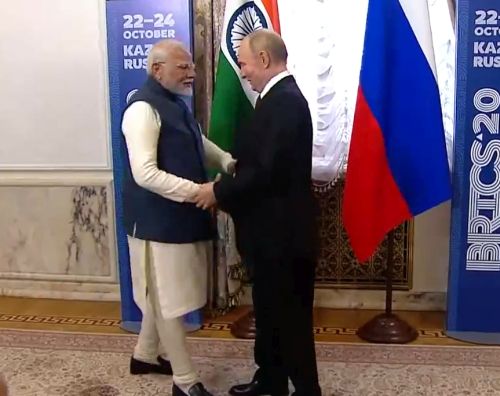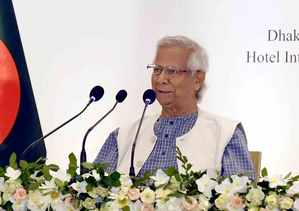International
India to be world's most populous nation despite decline after 2060s peak: UN expert
United Nations, June 12 (IANS) India will continue to be the world’s most populous country into the next century, even though its population will peak in the mid-2060s and begin a slow decline, according to a population expert.
India is “currently the largest country in the world in terms of population, and it is projected to stay so throughout the century,” Senior Population Affairs Officer Clare Menozzi said on Thursday at the release of the UN World Population Prospects 2024 Summary.
India’s population is “supposed to peak around the 2060s in size and then it starts to slightly decline,” she said. “So by the end of the century, India is projected to be around 1.5 billion, but still the largest country in the world by a large margin.”
According to the data accompanying the report, India’s population is projected to grow from 1.45 billion now to a peak of 1.7 billion in 2064 when the decline begins, and register 1.5 billion in 2100, a 12 per cent drop.
The report noted that India is among the countries where the working-age population – 20 to 64 years – will grow through 2054,” offering a window of opportunity known as the demographic dividend.”
To capitalise on this opportunity, countries must invest in education, health, and infrastructure, and implement reforms to create jobs and improve government efficiency, the report suggested.
Life expectancy for Indians is projected to grow from 72.24 years now to 83.3 years by 2100.
The total fertility rate for India, which is the number of children a woman has, will decline from the current 1.96 and start the next century at 1.69.
A total fertility rate of 2.2 is considered the replacement rate that will hold the population steady, and a dip below that signals a decline in population, although it could still be growing because of increasing life expectancy and because of the previous population growth that resulted in a large number of younger women who will be of child-bearing age.
In the next 30 years, Pakistan will become the world’s third-most populous country, according to the report’s projections, increasing its population from the current 251 million to 389 million in 2054, overtaking the United States and Indonesia.
That year, India is projected to have a population of 1.69 billion and China 1.21 billion.
For the world, the population will peak in the mid-2080s, growing over the next sixty years from 8.2 billion people now to around 10.3 billion in the mid-2080s, and then will slide to around 10.2 billion by the end of the century, according to Navid Hanif, the United Nations Assistant Secretary-General for Economic Development.
The report drew attention to the trend of an ageing population, where senior citizens will outnumber children.
By the late 2070s, the global population aged 65 and older is projected to reach 2.2 billion, exceeding the number of children under 18, and by the mid-2030s, those aged 80 and over will outnumber infants reaching 265 million, it said.
The trend towards a preponderance of an ageing population is already happening in several countries
The report proposed that countries consider the use of technology to improve productivity at all ages and expand lifelong learning and re-training to extend working lives for those who can and want to continue working.
About the future of the globe with a burgeoning population and the stress on the environment, Population Division’s Director John Wilmoth said that the impact will be from behaviour, rather than the numbers.
“What the world is like in 60 years, will depend on a lot of choices that will be made between now and then, policies that will be implemented or not, and technological advances and so forth,” he said.
“All of these things will change the world that we’re living in. Population trends will be one part of that, but not necessarily the largest or the determining part,” he said. “What really matters is our behaviours and the choices that we make.”
(Arul Louis can be contacted at arul.l@ians.in and followed at @arulouis)
–IANS
al/kvd
International
Lee Hsien Yang seeks refuge in United Kingdom

Lee Hsien Yang, the youngest son of Singapore’s founding father, the late Lee Kuan Yew, announced on Tuesday that he is now a political refugee in the United Kingdom after seeking asylum from the British government “as a last resort.”
“I remain a Singapore citizen and hope that someday it will be safe to return home,” Lee stated in a Facebook post, as reported by Channel News Asia (CNA).
Citing what he described as the Singapore government’s “attacks” against him, Lee, who is the younger brother of former Prime Minister Lee Hsien Loong, revealed that he sought asylum protection in 2022.
Lee Hsien Yang and his late sister, Lee Wei Ling, who passed away earlier this month, have been in conflict with their brother Lee Hsien Loong over the fate of their father’s home following his death in 2015, resulting in a public dispute that has estranged the siblings.
In an interview with the UK-based newspaper The Guardian, Lee alleged that a “campaign of persecution” compelled him to seek asylum in Britain.
In response to his claims, the Singapore government stated that there is “no basis” for his allegations of “a campaign of persecution” or other assertions regarding political repression in the country.
“Singapore’s judiciary is impartial and makes decisions independently. This is why Singaporeans have a high level of trust in the judiciary,” a government spokesperson remarked.
The spokesperson added that there are no legal restrictions preventing Lee and his wife, lawyer Lee Suet Fern, from returning to Singapore. “They are and have always been free to return to Singapore,” the spokesperson said.
Lee and his wife have been outside of Singapore since 2022, having opted not to attend a scheduled police interview regarding potential offenses related to providing false evidence in judicial proceedings concerning their father’s will and the family home.
Lee and his late sister, who had been living at the property, alleged they felt threatened while trying to fulfill their father’s wish to demolish the house. They also accused their elder brother, former Prime Minister Lee Hsien Loong, of abusing his governmental influence to advance his personal agenda.
International
Indo-Russian ties are stronger than ever before at BRICS

Kazan, Russia: Prime Minister Narendra Modi held a bilateral meeting with Russian President Vladimir Putin on the sidelines of the 16th BRICS Summit.
During the meeting, President Putin remarked, “I recall our meeting in July, where we had productive discussions on various issues. We’ve also spoken over the phone several times. I am very grateful you accepted the invitation to come to Kazan. Today, we will attend the BRICS Summit’s opening ceremony, followed by dinner.”
PM Modi responded by expressing his appreciation, saying, “I sincerely thank you for your friendship, warm welcome, and hospitality. It’s a great pleasure to visit such a beautiful city as Kazan for the BRICS Summit. India shares deep historical ties with this city, and the opening of our new embassy here will further strengthen these connections.”
International
Laos seeks to enhance nutrition amid climate change concerns

Vientiane (Laos), Aug 22 (IANS) Representatives from the Lao government and development partners have attended a conference here titled “Climate Change and Nutrition in Laos: Intersections and Interventions” to discuss the impact of climate change on nutrition in the Southeast Asia country and potential solutions.
Speaking at the conference, deputy director general of the Department of Hygiene and Health Promotion under the Lao Ministry of Health Viengkhan Phixay, said, “We gather to address a critical and interwoven issue: the impact of climate change on nutrition and how we can work together to tackle these challenges,” Xinhua news agency reported.
The Lao government is actively engaged in this endeavor, with numerous policies and initiatives aimed at addressing both climate change and nutrition, Lao National Television reported on Thursday.
“By leveraging the Scaling Up Nutrition network in Laos, which is led by the government, and supported by civil society, donors, and the United Nations, we have a robust platform to tackle the negative impacts of climate change while improving nutrition and overall health for everyone in Laos,” Viengkham said at the conference held on Monday.
The conference featured a series of presentations that not only detailed evidence-based research but also introduced innovative tools for measuring and enhancing nutrition under the impact of climate change.
The conference stressed the critical need for integrated approaches to tackle the intertwined challenges of climate change and nutrition, and setting the stage for impactful future collaborations.
–IANS
int/psd
International
One killed, seven injured in shootout in Iraq

Baghdad, Aug 22 (IANS) A civilian was killed while seven others were injured on Thursday in a tribal shootout in Iraq’s holy Shiite province of Najaf, according to a local security source.
The shootout erupted in the early hours between armed men from the local tribe in the al-Zarga area in northern Najaf, some 160 km south of Baghdad, a local police officer told Xinhua on condition of anonymity.
The clash resulted in the killing of an Iraqi civilian and the injury of seven others, including three Iranian Shiite pilgrims, the source added.
A joint force from the Interior Ministry’s emergency response division and Najaf provincial police arrested 53 gunmen from both sides of the shootout and seized weapons and ammunition, the Interior Ministry said in a statement.
It added that search operations are ongoing to locate additional gunmen and weapons, with more details to be released later.
The incident took place as numerous pilgrims traveled to the city of Karbala to observe Arbaeen, which marks the end of a 40-day mourning period for the killing of Imam Hussein, the grandson of Prophet Muhammad, in the Battle of Karbala in 680 A.D.
Typically, these pilgrims also visit Najaf as part of their journey to Karbala.
–IANS
int/jk/arm
International
Bangladesh seeks $1 billion budget support from World Bank

Dhaka, Aug 22 (IANS) Bangladesh’s interim government has sought $1 billion from the World Bank as budgetary support.
The call came from the country’s Power, Energy and Mineral Resources Adviser Muhammad Fouzul Kabir Khan’s meeting with Abdoulaye Seck, the World Bank’s Country Director for Bangladesh and Bhutan, in Dhaka on Wednesday.
He made the plea as the ministry owes more than 2 billion dollars to suppliers in import costs of power and energy, Xinhua news agency reported.
Khan mentioned that the interim government, which was formed with many pressing mandates, is due to settle a $2 billion debt left by the previous government in the power sector.
He said they have already suspended activities under the much-criticized Quick Enhancement of Electricity and Energy Supply Act 2010 and abolished the government’s power to set energy prices without any public hearing.
On August 5, the former Prime Minister of Bangladesh, Sheikh Hasina, was ousted from her country and power, ending her rule since January 2009.
This event was seen as a massive escalation, with what initially started as student’s protests and resulted in a major crisis in Bangladesh.
Earlier on August 8, Nobel laureate Muhammad Yunus took oath as the head of Bangladesh’s interim government.
–IANS
int/jk/as
-
Video2 years ago
PM Modi Attacks Congress in Karnataka with “Kerala Story”
-
Politics2 years ago
Siddaramaiah & DK Shivakumar sworn in as Chief Minister & Deputy CM respectively
-
Cricket2 years ago
CSK players rejoice 5th IPL title with their families (Pics)
-
Entertainment2 years ago
Karan Deol weds his longtime Girlfriend Drisha Acharya (Pics)
-
Sports7 years ago
History Of Official FIFA WORLD CUP Match balls
-
India2 years ago
Ashwini Vaishnaw: Railway Board recommends CBI probe in the Odisha railway disaster
-
Entertainment2 years ago
Urvashi Rautela dazzles on Cannes 2023 red carpet (Pics)
-
Entertainment2 years ago
Sunny Leone gets ready for Kennedy premiere in Cannes (Pics)






























